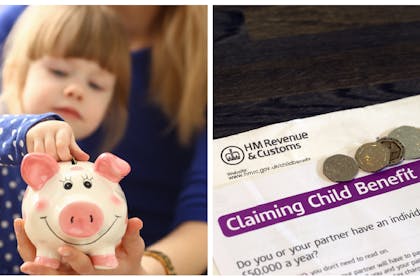Experts warn a 'stealth tax' means huge numbers of parents are losing out on payments worth over £1,000 a YEAR
The number of families claiming child benefit is at a 'record low' because of outdated tax rules, say financial experts.
The latest records from HMRC show that the number of families claiming child benefit dropped by 43,000 in 2022.
Its thought that many households have stopped claiming child benefit altogether because they're worried they'll be hit with the High Income Child Benefit Charge. This tax sees parents earning more than £50,000 a year having to repay some, or all, of their child benefit.
This cap on earnings hasn't changed since it was introduced in 2013, meaning lots more families are now liable for the charge.
What is the High Income Child Benefit Charge?
The charge means that if either parent earns over £50,000 a year, they will have to repay some or all of the benefit.
If any parent earns over £60,000 per annum, they'll lose out on the benefit altogether.
Families losing out
However, experts argue that if the cap on earnings were in line with current inflation, it would be worth £65,000. And this would mean more families would be eligible for extra financial help.
Sarah Coles, head of personal finance, at investment company Hargreaves Lansdown, said:
'The stealthy creep of the High Income Child Benefit tax charge has forced over a million children out of receiving child benefit since 2013 and sent the number of families claiming to a record low.
'The fact the threshold hasn’t moved in a decade means more and more families are being hit by the charge, including thousands of basic rate taxpayers.'
She added:
'This isn’t just costing families money now, but could end up taking a serious toll in retirement too.'
Child benefit left out of the Spring Budget
It was hoped Chancellor Jeremy Hunt would help parents avoid losing the benefit through his Spring Budget in March. However, while childcare policies were brought in, child benefit was left out.
- Why some working parents are turning down pay rises
- Martin Lewis answers YOUR top 6 money questions
- Benefits and allowances over Easter 2023
It was hoped the High Income Child Benefit Charge threshold would be increased, or scrapped altogether to allow those getting pay rises which take them over the threshold to continue their benefit claims. However child benefit rules were not altered.
Around 200,000 families will go over the £50,000 threshold in the 2023-24 tax year, figures from the Institute for Fiscal Studies (IFS) suggest.
It means that thousands more parents will lose out on child benefit – worth up to £1,248 a year for the first child and then £751 a year for each subsequent child.
Parents are turning down pay rises
Due to this High Income Child Benefit Charge rule, some parents are resorting to deliberately turning down pay rises , to ensure they don't breach the threshold which would see them miss out on much-needed child benefit.
For a long time, many parents have spoken out against 'unfair' child benefit rules – brought in in January 2013 – because the rule is only based on the income of 1 parent.
It means a household with a lower total income (such as when 1 parent earns and the other stays at home, or a single parent earns more than the £50,000 threshold) misses out on the benefit, while a family receiving more money in total (with 2 parents earning, say, £45,000 for a total of £90,000) could still be eligible.
Child benefit was not discussed in the Spring Budget
The government could have scrapped the HICBC rule altogether, or, could have raised the threshold to a higher rate to reflect rising wages. However, it was not discussed as part of the childcare reforms that were put in place.
The IFS, who conducted research on the figures, said: 'The high-income child benefit tax charge, introduced in January 2013, means that child benefit is tapered away for families whose highest-income partner has an annual income above £50,000.
'For every £100 of that individual’s income above £50,000, child benefit entitlement falls by 1%.
'This means that if the higher-income partner’s income is below £60,000, then the family is eligible for a partial payment, whereas if income is at or above this amount, the family is not eligible for child benefit.'
'These thresholds are frozen in nominal terms, meaning that every year more families lose eligibility for some or all of their child benefit.'
If the amounts had been altered in line with inflation, the rule would kick in once a parent's salary goes above about £65,000, and a parent would stop being paid the child benefit altogether at roughly £78,000.
What is child benefit?
Child Benefit is a payment that you can claim if you’re responsible for a child under the age of 16 (or under 20 if they're in full-time education or training).
You can claim as soon as your child's birth is registered. It's best to apply before they're 12 weeks old. This is because payments can only be backdated by three months, so you don't want to miss out.
While it's usually tax-free, if you or your partner earns over £50,000 a year, you may have to pay a tax charge on what you get.
How much child benefit should I receive?
From April 2023, the child benefit rates are as follows:
- £24.00 per week for your first child
- £15.90 per week, per child for any further children
If your family is split, with one child living with you and another with another person, you can both claim the full £24. If either of you have any other children, you'll get £15.90 for each additional child.
If your family is combined, with children from both partners living under one roof, the eldest child will qualify for £24, and any other children for £15.90 each.
These amounts are due to increase by 10% this month . Here's exactly how much Child Benefit you'll get from April 2023, depending on how many children you're claiming for:
- One child: £24 a week, or £1,248 a year
- Two children: £39.90 a week, or £2,074.80 a year
- Three children: £55.80 a week, or £2,901.60 a year
- Four children: £71.70 a week, or £3,728.40 a year
- Five children: £87.60 a week, or £4,555.20 a year
Who gets child benefit?
UK families can receive child benefit if they have children under 16, or under 20 if the child is in some kind of full-time education or training.
For one child, parents get £24 per week, and £15.90 for every additional child.
Related stories
What families can expect in this week's 'eye-watering' budget
Parents will get up to £780 extra in pay cheques from this month






